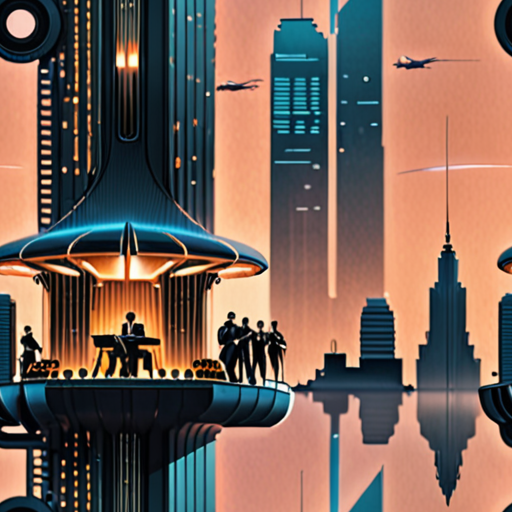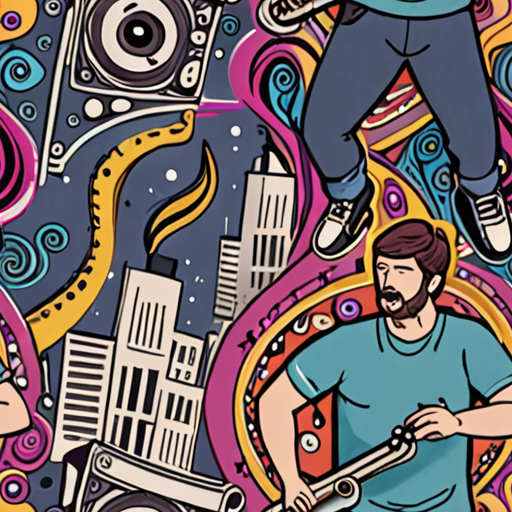Creating music for games can be a thrilling experience, allowing artists to tap into their creativity and bring immersive worlds to life through sound. With the rise of independent game development and the increasing demand for high-quality game soundtracks, the art of creating music for games has become a highly sought-after skill. Whether you’re a seasoned musician looking to break into the industry or a beginner eager to learn the ropes, understanding the tools, techniques, and best practices involved in creating music for games is essential for success.

Getting Started with Music Composition for Games
I’ve always been fascinated by the world of video games and the incredible soundtracks that bring them to life.
- As an aspiring music composer, I’m excited to share my journey with you and provide valuable insights on how to get started in this exciting field.
- Whether you’re a seasoned musician or just starting out, composing music for games can be a rewarding and creative outlet.
- In this article, we’ll explore the steps you need to take to become a music composer for games, from developing your skills to finding opportunities and building a portfolio.
Developing Your Skills
To succeed as a music composer for games, you’ll need to develop a strong foundation in music theory, composition, and production.
- Start by learning the basics of music theory, including chord progressions, scales, and rhythm.
- Practice composing music using digital audio workstations (DAWs) like Ableton Live, Logic Pro X, or FL Studio.
- Experiment with different genres and styles to find what works best for you and your target audience.
- Join online communities and forums to connect with other musicians and learn from their experiences.
Finding Opportunities
Once you have a solid understanding of music composition and production, it’s time to start looking for opportunities to apply your skills.
- Look for job postings on websites like Mandy.com, Staff Me Up, or GameDev.net.
- Network with other composers and industry professionals through events like GDC, E3, or PAX.
- Consider freelancing or working on personal projects to build your portfolio and gain experience.
- Stay up-to-date with industry trends and news by following reputable sources like Game Informer, IGN, or Polygon.
Building a Portfolio
A strong portfolio is essential for showcasing your skills and attracting potential clients or employers.
- Create a professional website or profile on platforms like SoundCloud or Bandcamp.
- Share your music on social media and engage with your audience to build a following.
- Collaborate with other artists or producers to expand your network and gain new perspectives.
- Continuously update and refine your portfolio to reflect your growth and evolution as a composer.
Conclusion
Becoming a music composer for games requires dedication, hard work, and a passion for creativity.
By following these steps and staying committed to your goals, you can turn your dream into a reality and join the ranks of successful game composers.
Programs That Make Music for Games
We’re often asked what programs make music for games, and the answer can vary depending on the type of game, its budget, and the preferences of the composer.
- Audacity: A free, open-source digital audio workstation (DAW) that’s great for beginners and hobbyists. Audacity offers a user-friendly interface and a wide range of features, making it an excellent choice for indie game developers.
- Cakewalk Sonar Home Studio: A professional-grade DAW that’s popular among musicians and composers. Cakewalk Sonar Home Studio offers advanced features, such as multi-track recording and editing, and is compatible with a wide range of plugins and instruments.
- Fantasia: A powerful DAW that’s known for its ease of use and flexibility. Fantasia offers a wide range of features, including support for MIDI files, VST plugins, and surround sound mixing.
- FL Studio: A popular DAW that’s widely used in the music production industry. FL Studio offers a user-friendly interface, advanced features, and compatibility with a wide range of plugins and instruments.
- Logic Pro X: A professional-grade DAW developed by Apple. Logic Pro X offers advanced features, such as multi-track recording and editing, and is compatible with a wide range of plugins and instruments.
- MuseScore: A free, open-source music notation software that’s great for composing and arranging music. MuseScore offers a user-friendly interface and a wide range of features, making it an excellent choice for indie game developers.
- Reason: A virtual studio rack that allows users to create and edit music using a variety of instruments and effects. Reason offers a user-friendly interface and a wide range of features, making it an excellent choice for indie game developers.
- Sibelius: A professional-grade music notation software that’s widely used in the music industry. Sibelius offers advanced features, such as score editing and printing, and is compatible with a wide range of plugins and instruments.
- Steinberg Cubase: A professional-grade DAW that’s popular among musicians and composers. Steinberg Cubase offers advanced features, such as multi-track recording and editing, and is compatible with a wide range of plugins and instruments.
- Traverso DAW: A free, open-source DAW that’s great for beginners and hobbyists. Traverso DAW offers a user-friendly interface and a wide range of features, making it an excellent choice for indie game developers.
In addition to these programs, there are many other options available for making music for games, including Ableton Live, Adobe Audition, and GarageBand. Ultimately, the best program for you will depend on your specific needs and preferences.
When choosing a program for making music for games, consider factors such as ease of use, feature set, and compatibility with your operating system and hardware. You may also want to read reviews and watch tutorials to get a sense of which program is right for you.
At Indie Dev Games, we recommend trying out a few different programs to see which one works best for you. We also offer a range of resources and tutorials to help you get started with music composition for games.

Cost of Music for a Game
The cost of music for a game can vary greatly depending on several factors, including the scope of the project, the type of music required, and the experience of the composer.
-
Indie Game Development
For indie game developers, the cost of music can be a significant portion of the overall budget. According to various estimates, the cost of music for an indie game can range from 5% to 15% of the total budget.
If we consider a typical indie game budget of $100,000, the cost of music would fall between $5,000 and $15,000.
-
Music Composition Process
The music composition process typically involves several stages, including conceptualization, composition, recording, and editing.
Each stage requires a different level of expertise and equipment, which can impact the overall cost of the music.
-
Types of Music Composers
There are two primary types of music composers who work on video games: in-house composers and external freelancers.
In-house composers are employed by the game development studio and work exclusively on the project.
External freelancers, on the other hand, work on a project-by-project basis and may have multiple clients simultaneously.
-
Factors Affecting Music Cost
The cost of music for a game is influenced by several factors, including:
- Scope of the project
- Type of music required
- Experience of the composer
- Equipment and software used
- Timeframe for completion
When working with a music composer, it’s essential to discuss these factors upfront to get a clear understanding of the costs involved.
This will enable you to plan your budget accordingly and ensure that the music fits within your overall project budget.
By considering these factors and working closely with your music composer, you can create high-quality music for your game without breaking the bank.

How to License a Song for a Game
Licensing a song for a game involves obtaining the necessary permissions from the copyright holder, typically the record label or publisher.
- Synchronization License
- Master Use License
- Clearing Rights
- Obtaining Licenses
A synchronization license grants the right to use the music in connection with visual images, such as in-game footage or cutscenes.
A master use license grants the right to copy and distribute sound recordings, allowing the game to reproduce and distribute the music.
Clearing rights involves obtaining permission from the copyright holder to use the music in the game.
To obtain licenses, developers can contact the copyright holder directly or work with a licensing agency or music library.
When licensing a song for a game, consider factors such as:
- Genre and Style
- Copyright and Royalties
- Usage and Distribution
The genre and style of the music should match the game’s atmosphere and tone.
Understand the copyright laws and royalty rates associated with the licensed music.
Determine how the music will be used and distributed in the game, including online and offline platforms.
Popular music libraries and licensing agencies include:
- House of Tracks
- AudioJungle
A music licensing platform offering a vast catalog of tracks for video games and other media.
A marketplace for royalty-free music and sound effects, offering a wide selection of tracks for games and other applications.
When working with music libraries or licensing agencies, ensure you understand the licensing terms and conditions, including:
- Licence Types
- Royalty Rates
- Usage Restrictions
Different types of licenses, such as exclusive and non-exclusive, and their implications for game development.
The percentage of revenue paid to the copyright holder for each sale or download of the game.
Any limitations on how the music can be used, such as in-game usage versus soundtrack releases.
By understanding the process of licensing a song for a game and considering key factors, developers can successfully integrate high-quality music into their project.
Music Licenses for Games
The cost of music licenses for games can vary greatly, depending on several factors such as the popularity of the track, the platform, and the scale of distribution.
-
Indie Track Costs:
The licensing fee for indie tracks can range from $600 to $1,500.
-
Popular Track Costs:
More popular tracks will generally cost more to license, often ranging from $10,000 to $50,000 or more.
-
Platform-Specific Costs:
Certain platforms may have specific requirements or fees associated with music licensing, such as console manufacturers or online gaming platforms.
-
Distribution Scale:
The larger the distribution scale, the higher the licensing fee will likely be.
When considering music licenses for games, it’s essential to factor in these costs and plan accordingly to ensure a successful project.
Resources for Indie Game Developers:
- House of Tracks offers affordable music licensing options for indie game developers.
- Indie Dev Games provides valuable resources and insights for indie game developers, including tutorials, reviews, and tips.
By understanding the costs associated with music licenses and utilizing available resources, indie game developers can create high-quality games that meet their budget and exceed player expectations.

Is All Game Music Copyright Free?
When it comes to using music in video games, many developers wonder if all game music is copyright-free.
- The short answer is no, most game music is not copyright-free.
- Copyright laws protect original musical compositions, which means that using someone else’s music without permission can lead to legal issues.
Types of Licenses Required
To use copyrighted music in a game, you’ll need to obtain the necessary licenses.
- A master use license grants permission to use a specific recording of a song.
- A sync license allows you to synchronize the music with visual elements in your game.
Indie Developers and Music Licensing
As an indie developer, you may think that using royalty-free music is the easiest solution.
- Royalty-free music is available, but it might not fit the mood or style of your game.
- You can also consider commissioning an original score or using public domain music.
Best Practices for Using Music in Games
To avoid copyright infringement, follow these guidelines:
- Research the music licensing process and understand the requirements for your game.
- Contact the music owner or publisher to discuss licensing options.
- Consider working with a music supervisor or attorney to navigate the process.
Conclusion
In conclusion, while there are ways to use copyrighted music in games, it’s essential to understand the licensing requirements and take steps to avoid copyright infringement.
By doing your research and working with the right professionals, you can find the perfect soundtrack for your game without breaking the law.




0 Comments